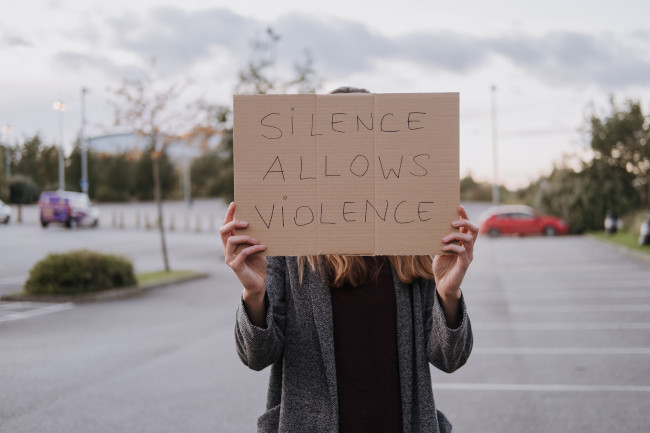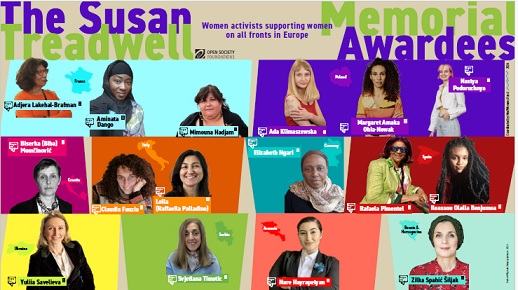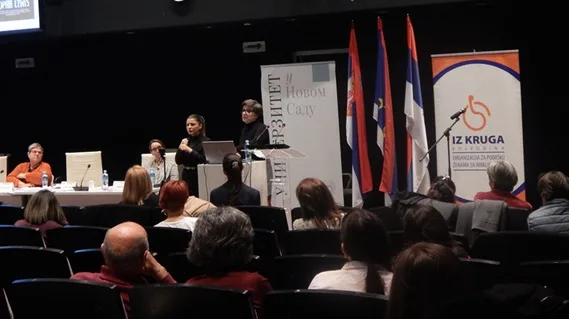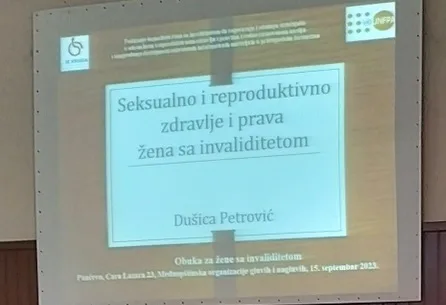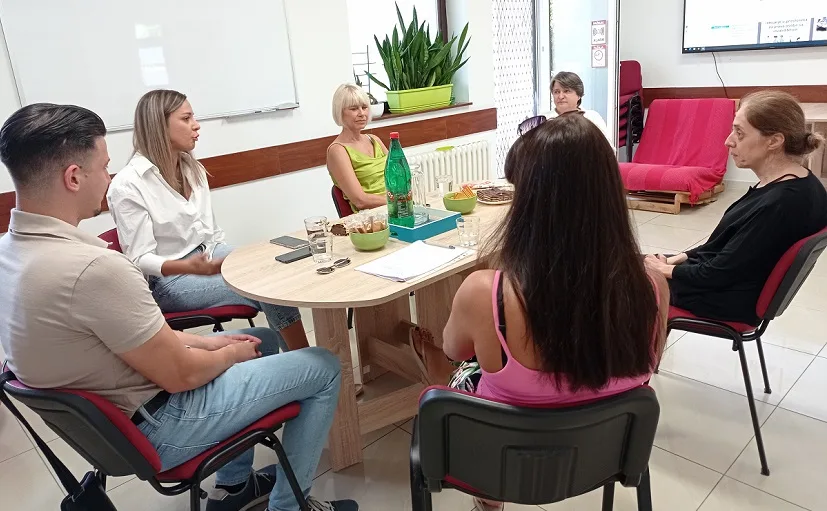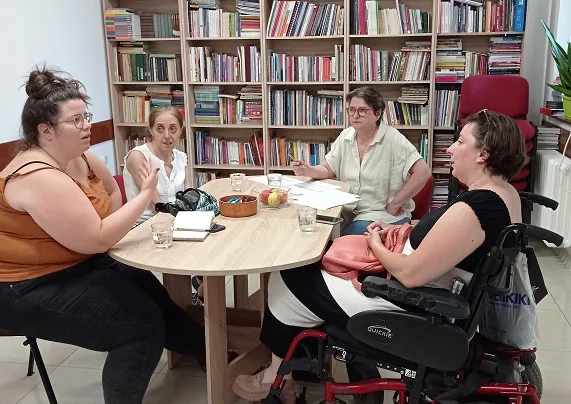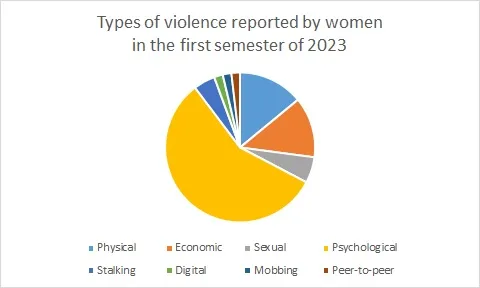Marija (30) has a university degree and is unemployed. She is an activist for the right of Roma women. After a turbulent marriage and divorce, she moved back to her parents’ house. Tanja (35) had been experiencing violence in an extramarital relationship for years. After the birth of a child, she went out of violence and joined her primary family. She is unemployed, thinking about paying the utility bills and continuing her education. Marija and Tanja are exposed to persecution and threats from their ex-partners, live in the danger of repeated violence. They are worried, not only for their safety but for their children and members of their primary family. They reported violent incidents and asked for the protection of the institutions in charge – some of the processes are finalized, some still last. During all that time, they are forced to have contact with ex-partners because they have the right to see the children.
I live in fear – to this day, I imagine him attacking me again. The father of my child has a criminal record. How can I trust him with a child?
Tanja
I do not feel safe. The environment blames me for my choices; institutions are not following the law. When I reported my ex-partner for violence, the policeman threatened me that Social Welfare could take the child from me if they determined we were both aggressive.
Marija
They do not find understanding in their immediate environment since they’ve made their own choice, endured, might even cause the violence. Not only the environment rejects their experience, but their statements are devalued in the institutions and support systems. There are still police officers that assess partner violence as a private matter, professionals in Social Welfare centers that judge the competence of a mother from an arrogant position, not taking into consideration the consequences of violence she was or still is exposed to, relativize her fear, reject any possibility of real risk and distance themselves from responsibility. The trials last long and are painstaking, often exposing the victim to new victimization and humiliation. They make the women face the abuser, his vision of upside-down facts, unfounded contra accusations, and are chances for new threats.
No protection. I expected justice and that he would pay for his deeds. It lasts for years, and one has to endure. I have no trust in the institutions anymore but I do not give up. Even though I have lost my health, although my past is pressed upon me in the present time and time again, and it is affecting my family, I have to stay calm till the end.
Tanja

How does getting out of violence look? Do divorce, and legal regulative of parents’ rights indeed end torture? Or is it just the beginning of a battle for a regular life?
Marija: – During our marriage, I have never been physically hurt. In those days, I was still at the university, and we both worked. Once or twice a year, he would become aggressive, but we would somehow sort it out. I always tried to find a solution. Until they see a bruise, women are often not aware of the types of violence they suffer. I believed that our relationship would improve when I gave birth to a child, but it didn’t happen. The first time I tried to call the police was when our baby was seven or eight months old, but my husband stopped me, and we attempted to make an arrangement one more time. I was with a baby the entire time while he had time for himself, and I started to suspect that he was seeing other women. I initiated a conversation about it: if there was a problem, we should deal with humanly. Arguments followed, he attacked me physically once or twice, but I didn’t give in. The last time he assaulted me with a knife. That time I gathered my things and left. I had a dilemma whether to report him or not, thinking it all happened in a frenzy, that I should calm down and wait, look into the situation more carefully, that I have postnatal depression, am overreacting. It will turn out that I did not exaggerate. The threats followed: if I don’t come back, it might cost me life; he would take a child from me since he was in a better material position. He disturbed me, but I did not respond to threats. In one instance, he came at me in a public place, started yelling, and pulling me. I went to the police but did not report him, just asking them to caution him.
A year later, he showed up in my parents’ house. He attacked me with an iron bar. Mum managed to protect me somehow and called the police. The policeman asked if I had suffered an injury. I said: – If my mother hadn’t been there, I might not be alive. The policeman answered: – If both of you had been aggressive, the Social welfare would have taken away the child. I managed to film part of the incident when he was holding a child in his arms while yelling and insulting me, but they told me it was not valid. After all this, my ex went to the police to report that I had attacked him. They sent us for a talk to the Social Welfare Center. There, in the service for supporting women victims of violence, I found out that I could sue him. I did not do that – I didn’t want to engage in a long-lasting, painstaking process – I wanted my life: to get a job, to take care of my child. Somehow the situation calmed down until I engaged in an emotional relationship. It infuriated him, and he started harassing us all over again. I reported psychological abuse, didn’t want to sue again, thinking it would be enough if the police cautioned him. Hopefully, Social Welfare would make him see the reason. The only litigation we had then was about parental rights. I got full custody, and the amount of alimony, which he pays regularly, is set.
Tanja: We were going out for ten years. We lived at his place, in one room. Then I rented a flat and decided to take out a loan. I was still working; we had a joint account until I realized his payment stayed his while we spent mine on living costs. The violence happened in cycles: he beats me up and then apologizes and asks for forgiveness. My parents judged me for living like that, but I was sure he would change. Especially when the baby comes: your blood has to change you. It changed me; it didn’t change him. I realized that I didn’t want my child to grow up in violence and decided not to come back to him. Five years ago, violence escalated to such a degree that the child’s life and my own were in danger. I had to move out of the apartment, although I was paying the utility bills. The police said: – If you stay in the apartment, we cannot protect you. I left with the police escort. When we were giving statements to the police, he arrived with a solicitor – I was alone. His entire family conspired against me, verbally assaulted, and insulted me. My parents backed me up but with an attitude that I was to blame since I let all that happen. From the amounted stress, I lost my breastfeeding supply, which I found the hardest. The first lawsuit for violence was filed in 2017. and is still in process. The judge leading the dispute has changed in the meantime, and my ex is changing his statements, claiming that he was the victim and that I abused him. His lawyer is unscrupulous. He doesn’t have to come to hearings since he has a counselor – I don’t. It is not known in court who is the accused and who is the victim. It happened that judges threatened me with a penalty or detention. I gave up my property rights because I didn’t have the nerve to lead that fight as well.
Last year, I learned that my ex had borrowed money from some influential and dangerous people under the pretext that our child was ill, so he was raising funds for treatment. What if someone knocked on my door to ask for money? My family and I are exposed to threats: he threatens to kill us, to rape my sister and mother, that we will all get a bullet in the head and that he knows he will go to jail only five years for the crime. Up to now, I have sued him twice for murder threats and three times for violence. It happened that the police said to me: – You must have made him do it! For violence, he was fined with a restraining order for three and six months and an ankle bracelet for murder threats. It doesn’t stop him from harassing us and jeopardizing our safety. Like I have no right to live. It is true: you get a slap first, and you will get a knife in the back too. I live in anxiety; I am still thinking about how he could attack me. He is up to anything.
Experiences in the Social Welfare Center: Systemic Judgment Instead of Support
Marija: My sister is a victim of high – risk violence, which she excepted as her everyday life. When I tried to tell her that she shouldn’t neglect her children in that situation, she got upset and started insulting me. Her husband physically attacked me. I reported him. The first thing a policeman told me was: – It is your family problem. It is not – domestic violence is a social problem. I had to insist the police did their job. We gave depositions; the court administered a restraining order to my sister and her husband and filed a lawsuit for endangering welfare. I didn’t want to sue them for domestic violence since it would endanger their children. They immediately violated the restraining order, attacked and insulted me again, the police came for them, and we were summoned to the Misdemeanor Court. My brother-in-law threatened me in front of the judge: that I would remember the beatings, that he would take away my child. The judge gave him a warning, but none of it went into the record. He was fined and sent to detention for thirty days and my sister for fifteen days. When they came out of prison, I got an answer from the prosecutor’s office that my claim was rejected because neighbors testified on their behalf. At the same time, I received a lawsuit initiated by my ex-husband together with them. They claimed that I caused a fight in a drunken state and left the child unattended on the street until the neighbors called the police. He used the situation to accuse me of child neglect. With the help of a good solicitor, it wasn’t difficult to prove the truth since there was paperwork that proved that I reported the incident first and a medical report about my state and injuries inflicted by my brother-in-law. They withdrew the lawsuit, but I was automatically condemned in the Social Welfare Center: – How could you leave a child unattended? I replied with facts, but the social worker answered: – We are not interested in the situation in your house. We are only interested in what the child suffered. She acted as if I was to blame for the violence. When I received their findings and opinion, I was beside myself. How can it be that they believe a man I have been complaining about for years, that tried to manipulate and molest me more than once? The center’s report was based solely on the things he said, not on the objective facts. The facts are that there are police and doctor’s reports, and after all my encounters they automatically depreciated. On the flip side, he doesn’t suffer any consequences for false accusations.
Tanja: – Even though I have suffered severe physical violence, my family and I are exposed to assaults, and I feel threatened, in the social care center say: – I do not see a reason for your fear. He is not dangerous – he has the right to see the child. After all, he is a father. He has never behaved like a father, shows no interest in a child, pays no alimony. How come he is not dangerous when he has a criminal record? The Social Care Center continually treats me as accused. They decide about the safety of my child. A social worker once told me: – I am to say where your child will sleep, not you! – Fine – I answered – what if the child gets hurt? – It is your problem then – you will be responsible. There is no protection for me. How can I let him see the child – he is a danger to his life? How long do I have to endure and stay away? What are my rights, how can I fulfill them, how can I protect myself? Looking back, I am amazed at how I survived.
Why did they Speak out?
Marija: – Patriarchy is widespread in our community, I can rely on the help of my parents, but I feel the society is blaming me for my choices and way of life. It is significant to raise awareness about violence itself. Violence is any form of constraining of the right to move and express oneself, any form of restraint, and not just a visible bruise. We need to act preventively. The law is meticulous, but praxis is failing. Institutions in charge are obliged to provide women with physical protection and psychological support, but this doesn’t happen. Due to the oversights by the institutions, our lives are in danger, health deteriorates, time is lost. Our opinions have no value. The failures of the institutions perpetuate the violence because the perpetrators know in advance that they will not be sanctioned. It has to change.
Tanja: – I would like to instigate other women to talk publicly. About violence, lack of support, the risk they face after getting out of violent situations. It is not a woman’s personal problem – it is a ubiquitous social problem that needs to be solved using adequate mechanisms instead of leaving the women to deal with it alone. Institutions in charge treat the victim and the perpetrator on the same level. I expected justice, and they treated me like a criminal. Something has to change. Who is evaluating the work of the professionals? I know that I am not the only one. Many women have terrible experiences in institutions. We need to speak up about the issue together. They might hear us then, and someone will react.
Real names are known to the editorial office.
The preparation of this media report was supported by UNDP within the project „Integrated Response to Violence against Women and Girls in Serbia III“. The views expressed in the media report are the sole responsibility of IZ KRUGA – VOJVODINA and do not necessarily reflect the views of UNDP or other participants in the implementation of this project.


